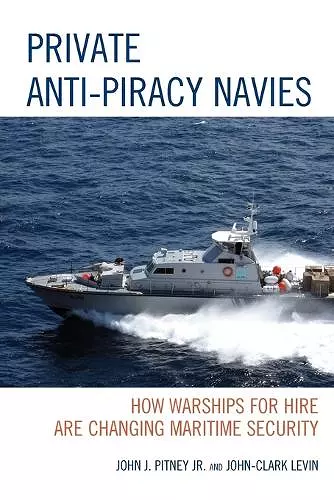Private Anti-Piracy Navies
How Warships for Hire are Changing Maritime Security
John J Pitney Jr author John-Clark Levin author
Format:Paperback
Publisher:Bloomsbury Publishing PLC
Published:27th Aug '15
Currently unavailable, and unfortunately no date known when it will be back

The twenty-first century has seen a sharp rise in privatization of the military, especially of logistics and security functions during the U.S.-led wars in Iraq and Afghanistan. The outbreak of Somali piracy that started in 2008 has prompted a similar revolution in maritime security. Private security companies began operating armed escort vessels to protect merchant shipping against pirates off the Horn of Africa. Private Anti-Piracy Navies is intended to provide a contextualized understanding of the historical origins, current state, and future prospects of this fast-changing sector. Centuries ago, the British East India Company used a private navy against piracy in the same waters with much success. Yet since then, international law has evolved to more tightly regulate the use of force by civilians, and to afford greater protections to suspected pirates. Thus, the development of what are in effect private warships has presented numerous legal and regulatory problems. How can the companies that operate these vessels be effectively licensed? Under what circumstances should they be allowed to use lethal force? This book explains how regulators in industry and government have attempted to answer such questions, and highlights the remaining areas of uncertainty. It also addresses the economic factors that drive the struggle between pirates and anti-piracy forces. Of equal concern are operational considerations such as defensive tactics, logistics, and rules of engagement. Security companies must carefully balance rights concerns against the need to defend ships effectively.
Partly due to the contribution of private security, piracy in the Indian Ocean has dropped significantly over the past two years, leading to widespread overconfidence. Governments under severe budget pressure may withdraw their naval task forces from the region prematurely, leading to a resurgence of Somali piracy. At the same time, pirates are wreaking havoc in the Gulf of Guinea off West Africa. The book concludes with an assessment of private naval forces’ prospects in these conflicts over the short term, as well as the implications for wider naval privatization in the long run.
This book is exceptionally well written and researched. Scholars interested in market process based approaches to understanding the world, however, will find many instances of inspiration for future research and paper ideas. * The Review of Austrian Economics *
From an academic point of view, the authors have compiled a well-researched summary of private efforts in the fight against piracy, starting with the British East India Company and discussing how international law has evolved, particularly in recent years. . . .The author's high level of expertise and the amount of information about efforts to regulate the private maritime security industry make this book an interesting read for anyone interested in the diverse efforts made to combat piracy. . . .Private Anti-Piracy Navies is therefore an interesting addition to academic papers discussing legal developments surrounding private maritime security. It is essential for anybody who is setting out on the perilous project of setting up a 'private navy' although it is difficult to imagine how this would be viable in current piracy hotspots such as the Gulf of Guinea or the Strait of Malacca. Readers who are interested in a comprehensive introduction to private efforts to counter piracy can use the book as an easily understandable guide. * The Bridge *
Private Anti-Piracy Navies does an excellent job showcasing and explaining the complexity of the issues facing these private entities, yet the authors accomplish this in an interesting and highly readable narrative that grabs the reader’s attention. How familiar one might be with piracy and the use of private navies to combat it are mute, for the authors clearly encapsulate the history, realities, and problems without lecturing or talking down to readers. . . .[T]his book provides an illuminating, thought-provoking examination on the background and issues and is well worth the read. * Pirates and Privateers *
Private Anti-Piracy Navies provides readers with an inside look into the little known private maritime security industry. The book begins by explaining the background of the piracy epidemic off the coast of Somalia and goes on to discuss the birth of the maritime security industry and the initial legal, economic, and tactical challenges various companies were obligated to deal with. The book concludes by assessing the future of the industry and ways to ensure its continued effectiveness. The authors’ high level of expertise and the abundance of information contained within makes this book a must read for anyone interested in the explosion of pirate attacks and the efforts being made to combat it. -- Christopher L. Daniels, Professor of Political Science, Florida A&M University, Center for Global Security & International Affairs
Private Anti-Piracy Navies: How Warships for Hire are Changing Maritime Security is the most comprehensive history of the private security response to piracy in the Horn of Africa written so far. These readings are essential to understanding the developments of Somali piracy as well as counter moves in other regions. -- Stig Jarle Hansen, Norwegian University of Life Sciences
ISBN: 9781498520560
Dimensions: 227mm x 155mm x 22mm
Weight: 449g
290 pages